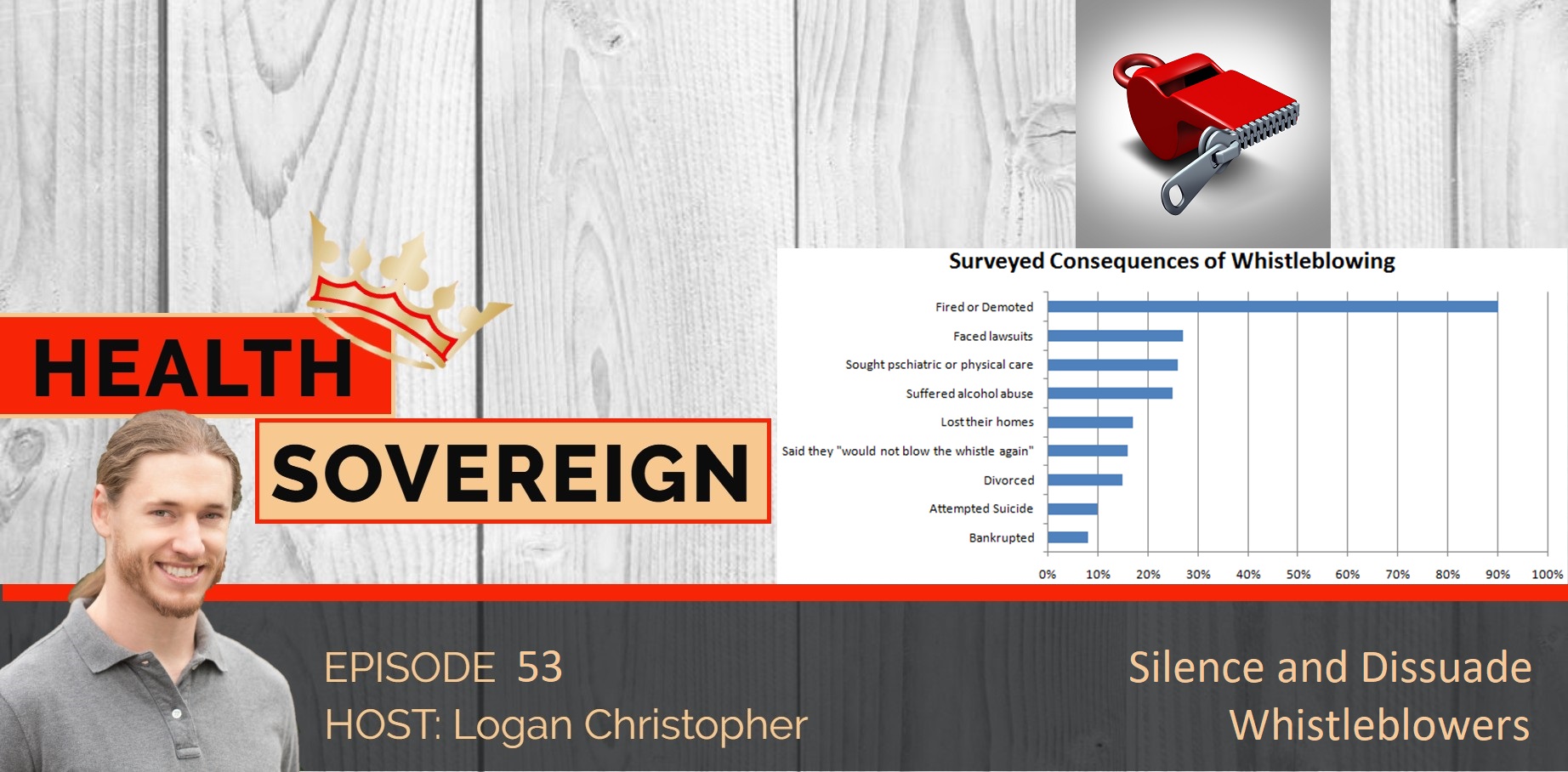A study on whistleblowers finds that they go through hell in the act of blowing the whistle. Almost all of them get fired, some attempt suicide, losing their homes and spouses and much more.
Facing this, would you blow the whistle?
Our whistleblowers tend to be smeared rather than held up on a pedestal for doing the right thing.
The fact is there are LOTS of whistleblowers when it comes to Big Pharma and their regulators.
This is the first in a five-part series on whistleblowers.
Did you enjoy the podcast? Let me know by leaving a short review and be sure to hit that subscribe button so you don’t miss any future episodes!
Click the link below to see written articles and references.
Medical Monopoly Musings #55
Silence and Dissuade Whistleblowers
Donald Soeken conducted a study with 233 whistleblowers in government and the private sector. He found:
90% of the whistleblowers were fired or demoted
27% had lawsuits brought against them
26% sought psychiatric or physical care
17% lost their homes
15% got divorced
10% attempted suicide
8% were bankrupted
And yet only 16% said they wouldn’t do it again. But maybe it’s because these ones got through it…
A NY Times article covering this 1987 study stated, “Mr. Soeken said there are seven stages of life for the whistle blower: discovery of the abuse; reflection on what action to take; confrontation with superiors; retaliation; the long haul of legal or other action involved; termination of the case, and going on to a new life.”
Few make it to the last stage. In other words, whistleblowers go through hell. While we know of quite a few successful cases, how many are effectively stamped out by such actions?
If Big Pharma is as corrupt as I’ve been showing then why don’t we have more whistleblowers? THIS is a big part of why.
Understand that whistleblowers were a big reason that Big Tobacco ultimately lost the public battle.
Understand that the PR Firms and lawyers that worked for Big Tobacco learned from those lessons to better serve other industries.
And the fact is there are LOTS of pharma whistleblowers…you just don’t know about it because the media often doesn’t give them credit, especially these days.
Senator Chuck Grassley stated in 2005 that “According to the Department of Justice, there are currently under seal in the neighborhood of 100 whistleblower cases involving allegations against over 200 drug companies. During the past four years, the [justice] department recovered nearly two and a half billion dollars from whistleblower cases against drug companies. Unfortunately, it appears that some drug companies are placing greed ahead of drug safety.”
Peter Rost MD is the author of “The Whistleblower: Confessions of a Healthcare Hitman” about his whistleblower experiences at Pfizer, Pharmacia and Wyeth.
After blowing the whistle the companies hired private investigators to dig up dirt on Rost. He obtained these files which “implied that I might put a gun to my head so my family could get my life insurance”.
Rost worked hard to expose the dirty secrets of the industry, especially around drug costs and reimportation.
In his book he reports on an internal survey conducted at Pfizer. This included 49% of employees not agreeing with the statement, “Management is willing to give up short-term gain to do the right thing.”
30% didn’t agree with “Senior management demonstrates honest, ethical behavior.”
He writes, “If an individual is convicted of a crime, we call him a criminal; however if a company is convicted of a crime, what do we call it? We don’t call it a criminal corporation, but perhaps we should…[W]hen you look at the public record, these companies appear more like mob enterprises than law-abiding organizations. The only explanation I have is that money corrupts—again and again.”
Why is being a whistleblower so tough? “I was up against not just the largest pharmaceutical company in the world and the best lawyers money could buy, but also the best PR machine ever invented,” explains Rost.
It is not only that the media doesn’t cover whistleblowers often, it is that they are, more often than not, used to smear them.
How many do NOT blow the whistle because they’ve seen what happens?
Peter Rost was finally fired from Pfizer despite employee protections. In 2005, the American Council on Science and Health (ACSH) named him “Whiny Whistleblower of the Year” an award for those that who “outrageously defied his or her employer, regardless of loyalty, science or even common sense.”
The ACSH’s tagline is “Promoting science and debunking junk since 1978.” They’ve been funded by Pfizer, Bristol-Meyers Squibb, Merck, Abbott, Eli Lilly, Johnson & Johnson, PhrMA and many others.
Whistleblowers may be the most devastating enemy of those in power. All the more reason to use every tool possible to keep them quiet. All the more reason for you and I, the people, to look at what they’re saying.
References:
https://www.nytimes.com/1987/02/22/us/survey-of-whistle-blowers-finds-retaliation-but-few-regrets.html
Rost, P. (2006). The whistleblower: Confessions of a healthcare hitman. Brooklyn, NY: Soft Skull Press.
https://www.acsh.org/news/2005/12/30/whiny-whistleblower-of-the-year-award
